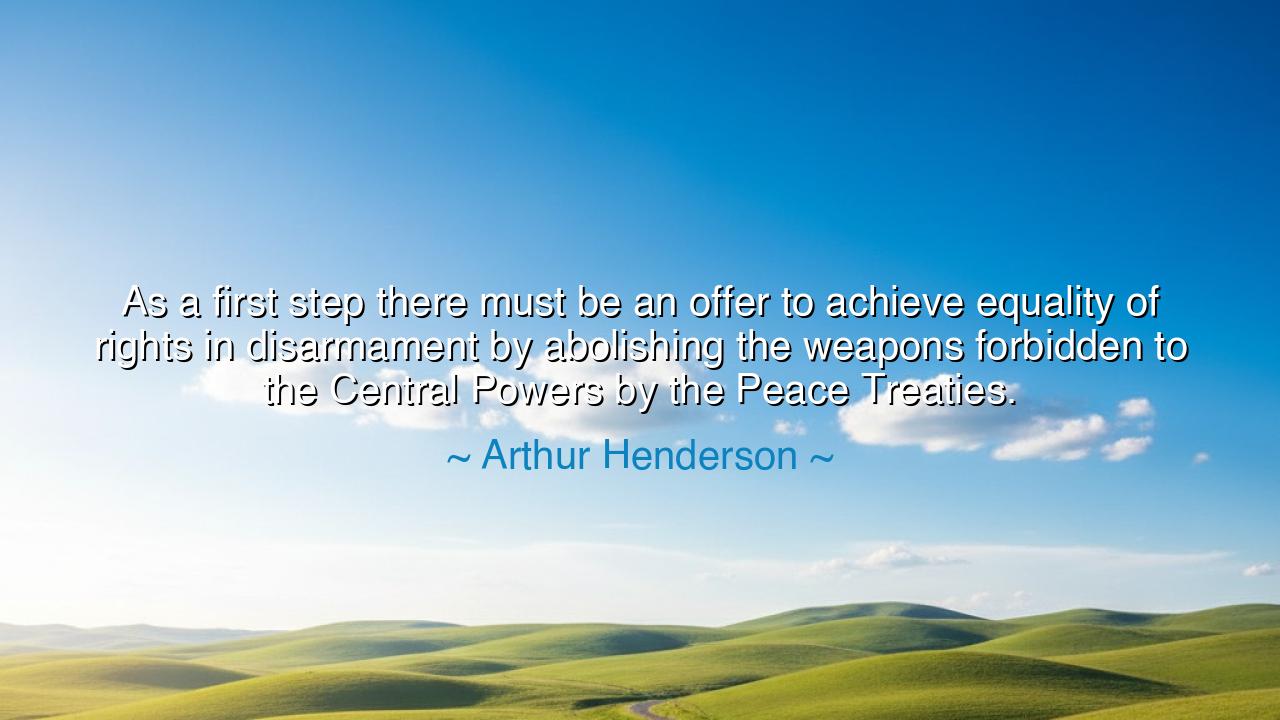
As a first step there must be an offer to achieve equality of
As a first step there must be an offer to achieve equality of rights in disarmament by abolishing the weapons forbidden to the Central Powers by the Peace Treaties.






In the annals of human history, the pursuit of peace has been both the most noble and elusive of goals. For eons, nations have risen to power on the battleground, seeking to impose their will upon the world. Yet, in the wake of the destruction and devastation that warfare brings, the seeds of disarmament have also been planted—seeds that yearn for a future where the drums of war are silenced and the might of weapons is replaced with the strength of diplomacy. Arthur Henderson, a name synonymous with the noble cause of peace, once declared, "As a first step there must be an offer to achieve equality of rights in disarmament by abolishing the weapons forbidden to the Central Powers by the Peace Treaties." These words are not merely a call to action but a clarion call to the heart of humanity, urging us to seek equality, not only in the rights of men, but in the tools of destruction that have long divided us.
To understand these words, we must first delve into the history that shaped them. The Central Powers, after their defeat in the First World War, were bound by the Treaty of Versailles, a document that sought to impose a peace upon the world but also to place the weight of guilt and responsibility upon the defeated nations. Among the many provisions of the treaty was the forbidden use of certain weapons, a symbolic attempt to limit the capacity for destruction that had caused so much bloodshed. Yet, Henderson was wise enough to recognize that true peace cannot be achieved by punishing one group while allowing others to maintain their destructive power. Equality in disarmament was not a mere ideological dream—it was a moral necessity, a first step towards a world where the threat of violence would no longer define the relations between nations.
The call for equality in disarmament speaks to a deeper truth about the nature of power. When nations possess weapons that can bring death and ruin on a scale unimaginable to the common people, they hold the fate of the world in their hands. But true strength is not found in the ability to destroy; it is found in the wisdom to restrain oneself, to build rather than destroy. Henderson's words are a reminder that the road to peace begins with equality, not just in the laws and rights that govern people, but in the systems of power that control the weapons of war. For how can we speak of justice if some nations are forced to disarm, while others remain armed to the teeth?
In the ancient world, the great emperors and philosophers recognized that the road to peace was not a simple one. Consider the Roman Empire, which, at its height, wielded power across vast lands. Yet, even in the shadow of its might, there were wise men like Cicero who spoke of the need for balance and justice in the governance of nations. Cicero understood that the balance of power must be rooted not in domination but in the fair treatment of all peoples. He warned that the unchecked ambition of the powerful could lead to ruin for all. In much the same way, Henderson's call for equality in disarmament is a call to prevent the abuse of power, to ensure that the pursuit of peace is not tainted by the desire for domination.
In the aftermath of the Second World War, the world found itself again at a crossroads. The United Nations was established, not just as a body for diplomacy, but as a means of ensuring that the sins of the past would not be repeated. The Cold War loomed over the world, with the great powers armed with weapons capable of ending human civilization. Yet, even in the face of such overwhelming threat, leaders like John F. Kennedy recognized that true peace could only come if nations acted in good faith and worked together to limit the very tools that had brought humanity to the brink of destruction. The arms control treaties of the 20th century were born out of this recognition—that disarmament must be a shared goal, and not one imposed upon the weak by the powerful.
So, what lesson can we take from Henderson's words? We must understand that true peace cannot be built on the inequality of nations. The destruction of weapons is not merely the reduction of physical power, but the restoration of moral equality. If we are to live in a world where peace is more than just a dream, we must work together to dismantle the instruments of war. The nuclear arms race, the development of chemical weapons, and the proliferation of arms across the globe have shown us the dangers of inequality in the power to destroy. And so, we must act—not with the pride of conquerors, but with the humility of those who seek a world where the desire for peace outweighs the temptation of war.
Let us then take the wisdom of Henderson’s words and apply them in our own lives. In our relationships with others, let us seek equality—not just in our words, but in our actions. Let us recognize that true strength comes not from overpowering others, but from building bridges, from disarming the violence within ourselves and in our nations. Let us be stewards of peace, not just in our homes and communities, but on the world stage. For in this, we honor the memory of those who have struggled before us and honor the promise of a future where equality, peace, and disarmament are not merely ideals, but the very fabric of our existence.






AAdministratorAdministrator
Welcome, honored guests. Please leave a comment, we will respond soon